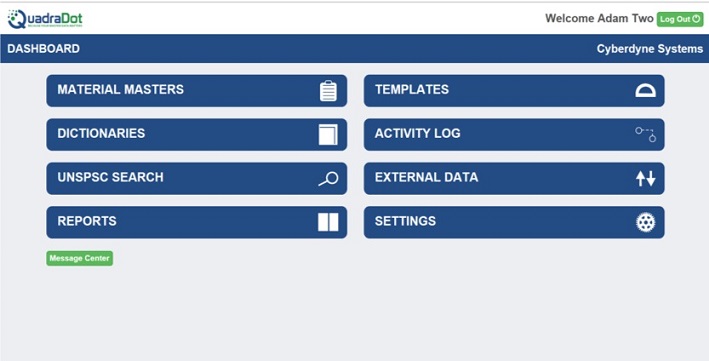As the corporate world leans into more efficient processes, CEOs are looking toward master data management.
But if you’re anything like me, the term master data has you scratching your head. In an effort to learn more, I sought out Adam Troller, Business Development Manager for QuadraDot Solutions. A leader in master data management, QuadraDot Solutions is gearing up to launch its very own cloud-based software, Granite, which is designed as a solution to poor material master data. Troller, who had a key role in the development of Granite, is the perfect source of information on this interesting, if not sometimes confusing, topic. I sat down with him to get the scoop on what exactly master data is, and why it’s so crucial for business operations.Mastering master data
In its most basic sense, master data refers to the business inputs that are essential to a company’s operation, says Troller, adding that it may include information on purchasing, pricing, suppliers, clients, and even customers. Quality data is consistent. It is accurate, complete, and easy to access by those who require the information. “In the past, companies have used large databases and complex spreadsheets and we want to help them get away from those because they are really hard to maneuver and use.”When Troller and his team set out to create Granite as a solution to the aforementioned problem, it was decided that the software would specifically address material data, to include what a company orders, makes, sells, warehouses and/or uses. While the team is currently dedicated to delivering a knockout software that meets what they consider to be a great need in the world of business, they hope to eventually expand Granite to include vendor masters and customer masters.
Is poor data costing you?
Poorly managed data is not just the absence of good data. Poorly managed data creates a company culture wherein customer satisfaction is affected, employee experience is tainted, and bad decisions are made by management. Bad data also costs a lot of money. In fact, IBM recently found that bad data costs the United States $3 billion each year. How is this possible?Perhaps the most obvious way that bad data is costing US companies money is in the time that it takes employees to navigate poorly organized information. One member of QuardraDot Solutions’ team recalled her past work in supply chain management. “Everyone would use a different naming structure for the same part. It was ridiculous,” she stated, recalling the inefficient processes that would later aide her in development of Granite’s top-notch coding.
A less obvious way that bad data is costing US companies money is in off contract buying. “Having good material master data will allow a company to increase efficiencies across their supply chain by eliminating off contract buying and allowing you to leverage your spend for future contract buys,” said Troller, adding that one of the ways a CEO can use good data to his advantage is to leverage his spend to drum up mutually beneficial contracts with preferred vendors
If a CEO is basing his or her decision off of data that is fragmented, incorrect, or altogether missing, the result is often missed opportunities and unforeseen costs. From off contract buying to poor customer outcomes, bad data can hit you where it hurts. In addition, people may blame their current ERP system and want to replace it. Naively expecting it to solve all of their data problems when in reality they have not fixed the underlying core problem. Which is the bad data itself.
To address the issue of poor data management, some large companies are hiring Chief Data Officers (CDO), whose role is to provide data and analytics governance for the company, with a goal of creating positive outcomes that align with the company’s objectives. Even these companies, which are well ahead of the curve in regard to master data management, can benefit from a software like Granite.
“A key differentiator in our software is that it will be able to be used with any existing software currently used by our clients. This agility will allow our software to be able to move with our clients as they grow and move from one resource planning software to the next. Our software will allow our customers to import their data from their existing spreadsheet or external system into our software. From there they will be able to create templates for materials and new material masters and then export it back into their system,” said Troller.

Why data management hasn’t been a priority for today’s CEOs There are several reasons for the lack of master data management among today’s business leaders. To start, CEOs are simply unaware that a solution like Granite exists. “That’s the challenge,” Troller states, “to reach out to the right people...the people who are familiar with master data and who are familiar with the benefits that come from having good data governance. These people are equipped to bring Granite back to their teams.” And even if a CEO is aware of master data management, and understands the importance of utilizing a software like Granite, they often have too much on their plates already. From managing day to day operations to ensuring that their employees have a positive working experience, CEOs are simply too busy to implement a new data management plan.
And finally, if a CEO is aware that a solution exists and finds the time to seek out master data management, it doesn’t mean that they end up with the kind of individualized service and thorough management that the professionals at QuadraDot Solutions are dedicated to providing their users. Often, CEOs are misled by big ERP systems and are sold master data management that provides fields and workflow but does not assist the client in building and maintaining the structure of the material.
The features of Granite, a solution to poor data management During our conversation, Troller gave me a crash course on Granite, the user friendly, cloud based software that allows companies to ditch their outdated spreadsheets and embrace consistency and efficiency. The techies of the world will be happy to know that it works with most ERP or WMS software for what Troller and his team refer to as “ERP Agnostic.” Through Granite, users can create standard definitions, abbreviations, and templates for their noun/adjective combinations. They can enforce proper taxonomy and identify duplicate records. Standard material masters are easily created with the use of user friendly templates.
An aspect of Granite that excited me is the four levels of access. This allows the CEO or CDO to identify appropriate staff for varying levels of access. For example, a Chief Data Officer (CDO) or any identified system administrator will access Granite as a Level 1 user with unrestricted privilege. A Level 4 user, or “Read Only” user, will not have the ability to make changes but can view information as needed.
I was surprised by the ease of which I navigated Granite’s features, however, I was still concerned that a tech averse individual might run into trouble. When I expressed this concern to Troller, he stated that the team at QuadraDot Solutions is anticipating this response and is dedicated to meeting each company’s unique challenges. “The software itself is user friendly,” states Troller, adding that his dedicated team of consultants is available to help. For users that need a lot of help from the get go, Troller and his team are available to walk them through step by step. For the more seasoned folks, who may have the tech experience but lack Granite specific know-how, training documentation and tutorials will help.
The next step
 Granite is set to launch in February 2019. It’s a date that Troller and the team at QuardraDot Solutions has looked forward to with anticipation. “It’s the culmination of a lot of hard work and a lot of dedication,” states Troller, his excitement contagious. When asked how he planned to celebrate the launch, Troller laughed and stated that a team meet-up in Hawaii may be in his future. “We all live in different cities,” states Troller, adding that he and the rest of QuadraDot Solutions’ data savvy crew have formed a strong, supportive working environment.
Granite is set to launch in February 2019. It’s a date that Troller and the team at QuardraDot Solutions has looked forward to with anticipation. “It’s the culmination of a lot of hard work and a lot of dedication,” states Troller, his excitement contagious. When asked how he planned to celebrate the launch, Troller laughed and stated that a team meet-up in Hawaii may be in his future. “We all live in different cities,” states Troller, adding that he and the rest of QuadraDot Solutions’ data savvy crew have formed a strong, supportive working environment.
“And the works not over yet,” Troller added, stating that QuadraDot Solutions has another product under development: a software similar to Granite that will meet the unique needs of small to mid-sized companies. QuadraDot Solutions also offers a consulting service that lays out exactly how a company can better their data governance. The outcome is organized, easy to navigate master data that is as unique as the company itself. To stay updated on the launch of Granite, and to learn more about how the software can help you manage your master data, visit https://quadradot.com/.

